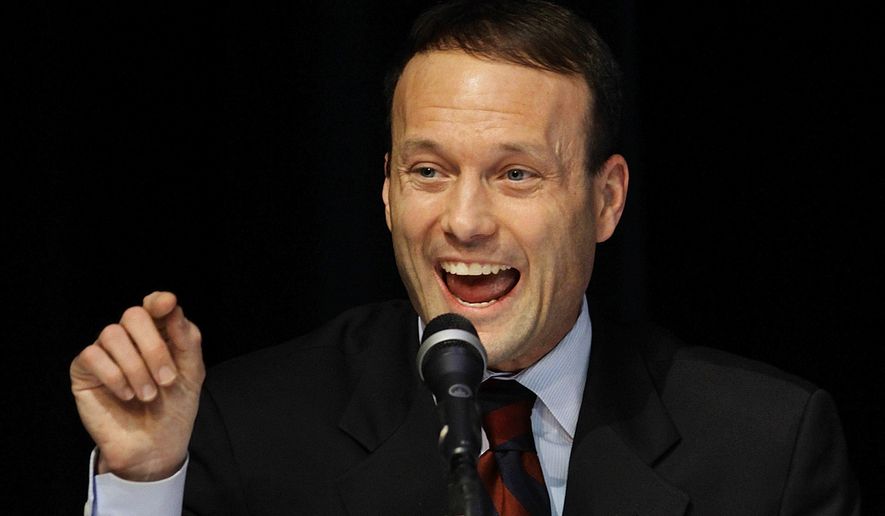The endless river of red ink forecast for federal spending would lead one to believe budget hawks are an endangered species.
But they’re still out there, toiling to draw attention to a problem that is getting worse — yet also getting almost no attention among the policymakers who could change things.
“Both parties are engaged in a war on math that math will eventually win,” said Adam Andrzejewski, who runs OpenTheBooks, a nonprofit dedicated to transparency in government spending. “We’re not going to tire or despair in our quest to convince elected officials that the math and their own constituents are right.”
The quest can be unforgiving when they look at the numbers and wonder why others aren’t as outraged.
Numbers released last week by the Congressional Budget Office show deficits are poised to soar past $1 trillion a year soon and remain there for the foreseeable future. Debt — the accumulation of those deficits — will top the record, from World War II, in the 2030s.
The CBO’s audience, Congress, met the numbers with a shrug.
Republicans want to spend more on defense, and Democrats want to spend more on everything else. On the campaign trail, President Trump rarely if ever mentions debt or the deficit, and the Democratic field is competing in a giveaway sweepstakes on college, health care, student loans and more.
“I can’t think of a time like this, where not just the budget outlook is bad but the lack of attention is even worse,” said Bob Bixby, executive director of the Concord Coalition who has almost three decades in the budget watchdog business. “It is disheartening, although we have seen something of an increase in what we call ’fiscal lookouts’ among people who have contacted us to say, ’You guys are still around?’”
Concord is indeed still around, and it has been joined by a host of other watchdogs eager to call out Washington’s taxing and spending habits.
Mr. Andrzejewski, 49, has been attracted to fiscal responsibility since elementary school when his father, a conservative Democrat, ran for the Illinois legislature on that issue. Though his father’s bids were unsuccessful, “the nobility of public service was instilled in me at a young age,” he said.
That led him in 2011 to OpenTheBooks, the brainchild of former Sen. Tom Coburn, a Republican whose motto is “Every dime. Online. In real time.”
Mr. Coburn and OpenTheBooks have had real success, Mr. Andrzejewski said. He pointed to legislative accomplishments such as the ban on earmarks, which is still holding.
But spotlights like those that OpenTheBooks and the Concord Coalition try to shine on spending can become obscured in the fog of political campaigns promising money for health care, college and other expenses.
The researchers offer various reasons for the seeming nonchalance.
The notion that the government seems too big to fail is one; historically low interest rates is another. Although the Obama administration flooded the money supply with billions of dollars through “quantitative easing,” the kind of inflationary boomerang such easy money would cause theoretically hasn’t materialized.
“The national debt has topped $22 trillion, and the fact it doesn’t scare the financial markets is unbelievable, remarkable,” said Chris Edwards, a tax and budget policy analyst at the libertarian Cato Institute think tank and the editor of its DownsizingGovernment.org website.
“If you go back and look at the notes and speeches from Carter, Reagan — the reflected fear that if you ran deficits, it was going to raise interest rates, mortgages, and that was bad politics,” he said. “But now there doesn’t seem to be any short-term political pain for deficits, and I don’t know what the solution to that is.”
Mr. Bixby also reflected on the budget hawks’ glory days, a time toward the end of the 1980s and into the 1990s in which budget concerns were bipartisan issues and made headlines.
“We do get together and scratch our heads about it all,” Mr. Edwards said. “It’s very disheartening. The Democrats, well, and the GOP doesn’t believe in fiscal restraint anymore. It’s a philosophical change; they aren’t inspired by Reagan.”
Despite the seemingly bleak landscape, Mr. Andrzejewski and his cohorts are wearing a brave face.
From his Chicago headquarters, Mr. Andrzejewski has issued a flurry of reports on taxpayer spending, such as the Department of Veterans Affairs’ $20 million purchase of luxury art and more than $40 billion funneled to Ivy League schools from 2011 to 2017.
In the process, OpenTheBooks has become the world’s largest private database of public sector expenditures.
“We’ve captured 5 billion individual government spending transactions, including all disclosed federal spending since 2001; 49 of 50 state checkbooks; and 22 million public employee salary and pension records from 60,000 public bodies across America,” he told The Washington Times.
All of that leaves Mr. Andrzejweski confident that, at some point, the mountains of evidence will move lawmakers in a more fiscally responsible direction.
“Integrity. Laser focus. Tenacity. Boldness. Execution,” he said when asked which adjectives he would use to describe his daily attitude.
“Our fight for good government first started in Illinois, the Super Bowl of corruption,” he said. “Writ large, we now realize that the entire country is in jeopardy.”
• James Varney can be reached at jvarney@washingtontimes.com.




Please read our comment policy before commenting.